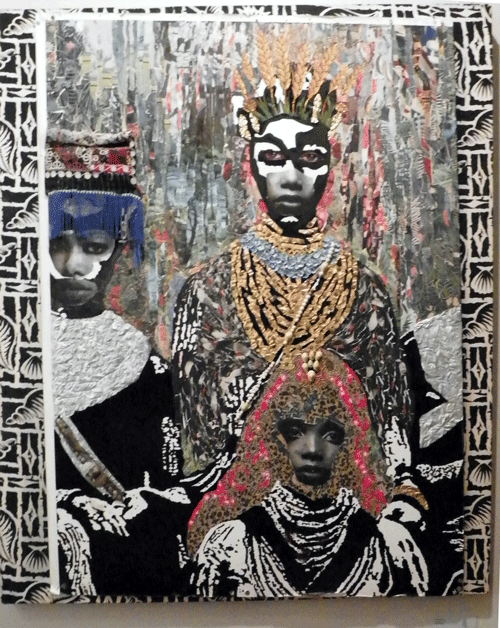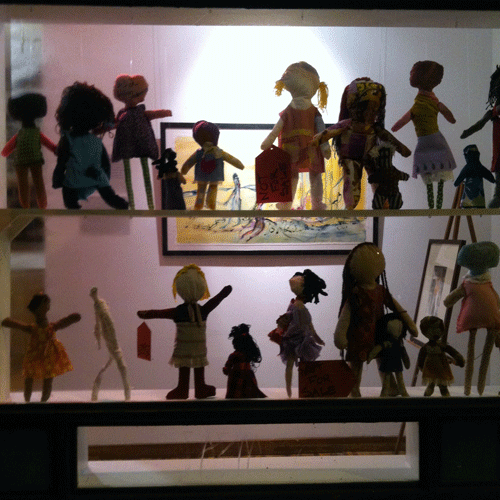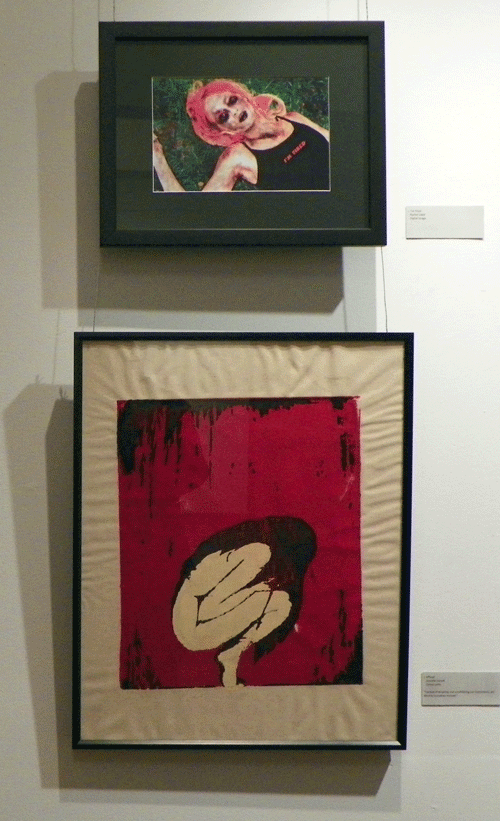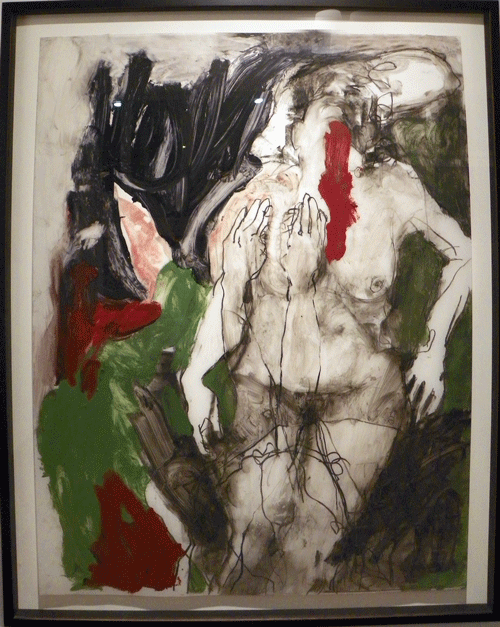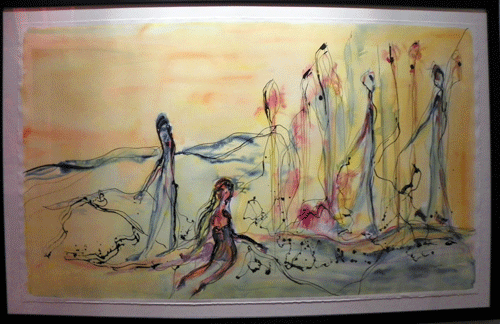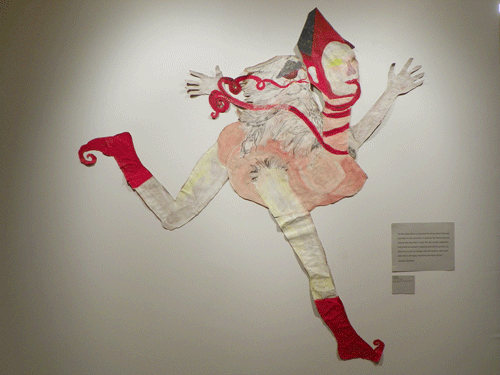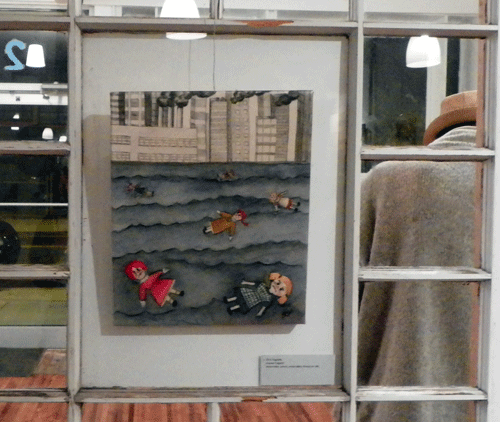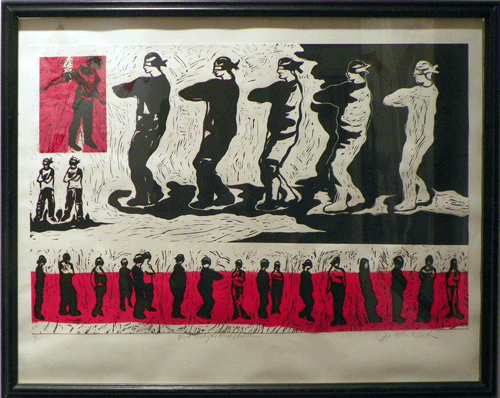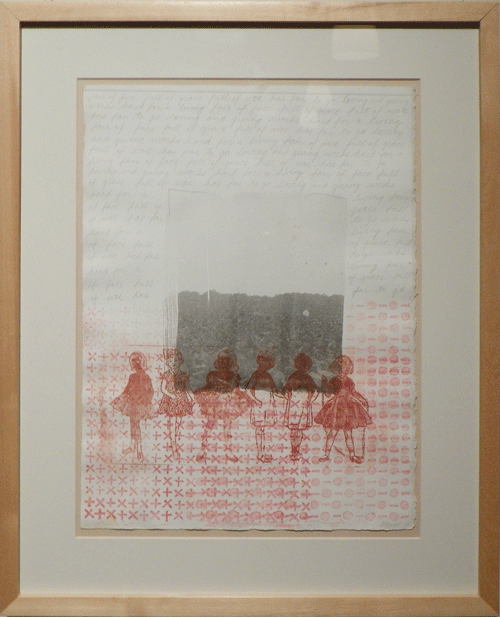Eva Preston, Judgement Day, mixed media at Stop Slavery Now: A Conversation About Human Trafficking
Bonnie MacAllister and Joanna Fulginiti know each other through the Women’s Caucus for Art and worked together at the Philadelphia Museum of Art, Rachel Udell, also a member in the show, worked at the museum as well. Bonnie explained to DoN, “We got into F & N Gallery because we were curated into a show…and we talked to the gallery director and he with a wonderful woman named Jess McCann invited us and donated the space to us, it was this beautiful collaboration. We were able to extend the call beyond our WCA members and got work from as far away as Atlanta, we have a film that was lent to us for the night, and the dolls will be in the window for a week.” Sorry, little DoNSters it’s taken a while to get this story together, this event was April First Friday, the dolls are at http://phila-wca.blogspot.com/2011/08/call-for-art-rag-dolls.html
The Ragdoll Project is meant to create awareness for human trafficking, they invited participants from different workshops, in West Philly through Spiral Q Puppet Theater, Follicle Hair Studio on South Street. Joanna described the production to DoN, “We set up sewing machines, we used donated fabrics and we just made dolls. The dolls will be sold and all the money will go to Dawn’s Place which is a shelter for victims of human trafficking in Philadelphia. Dawn’s Place is the only place in Philadelphia that helps victims of sex trafficking specifically. And they do need money, they need donations, so we’re going to sell all the dolls and donate all the money.”
Rachel Udell, I’m Tired, digital image and Danielle Ferrell, effraye’, screen print at Stop Slavery Now: A Conversation About Human Trafficking
“The dolls were made by the Women’s Caucus for Art and other people that come to our workshops. I get dolls sent to me in the mail everyday from people who heard about it on www.theragdollproject.org That will show you how you can make a doll and donate it, anyone can make a doll and it is a donation, so they won’t get it back but we’ll sell it and the money will go to the victims of trafficking.” Jess McCann, the co-curator of the show is part of the Philadelphia Modern Stop Slavery Group, she and Joanna Fulginiti selected art by women and intended the installation to have an educational aspect. “We have certain statistics or quotes that we felt were very important to capture about the issue that would inform the people something that they might not be familiar with. A lot are quotes from Johns who purchase sex, statistics about who is prosecuted; rarely are the pimps or traffickers prosecuted it’s usually the women, the women themselves. Who are often victims.”
Beth Prusky, This is How It Feels, charcoal and acrylic on archival mylar at Stop Slavery Now: A Conversation About Human Trafficking
“They wind up going in jail, that’s something people need to know about. The violence like this piece by Rachel Udell, this is about the violence women in prostitution face. They have a violent life.” Joanna points out a particular quote, “A study of 475 people in prostitution finds 62% reported having been raped, 73% reported having experienced physical assault and 92% said they wanted to escape prostitution.” Joanna is passionate about the subject, “It’s a violent life and the violence comes from the pimps and the Johns. People have this idea of prostitution like it Julia Roberts, Pretty Woman, glamorous, but it’s not. It’s full of violence. That’s what the first two pieces are about, the inner turmoil.”
Lauretta Paraguassu, Children of the Night, watercolor and ink on paper at Stop Slavery Now: A Conversation About Human Trafficking
Quote from a John, “She gave up her rights when she accepted my money.” Joanna dismisses this myth, “You know, men just kind of doing this like it’s that old boy’s club kind of thing, ‘there’s nothing wrong with this’, ‘this is how you treat women’, like blindly going along with this male idea.”
Megan Kelly, Body Monster, collaged painting on paper at Stop Slavery Now: A Conversation About Human Trafficking
Joanna Fulginiti, Ragdolls, mixed media at Stop Slavery Now: A Conversation About Human Trafficking
Joanna Fulginiti‘s painting started The Ragdoll Project, “I did that piece because these girls are just being treated like rag dolls, they’re not even human beings. They can be tossed away after they’re used and I started that and once we starting thinking of a project we could do to raise money for the victims and someone commented on my piece like, ‘Oh, maybe we can work with rag dolls.’ They’re not hard to make so that’s how we started with this.”
Stop Slavery Now: A Conversation About Human Trafficking
Joanna explained the context of the art, “Most people don’t know that the average age of a prostitute is 13 years old. Which is so scary, this is a children’s issue. Pimps are luring teenagers into this. The average age of entry is thirteen and actually the average lifespan of a girl after she enters prostitution is six years. So it’s stealing their childhood, that’s what these pieces are about. Suicide, homicide, like many of these girls are homeless girls, they may have lived in foster families their whole lives, so it’s not like they even know where they are. Some of these women became prostitutes and no one even came looking for them or cared where they are.”
Joyce Ellen Weinstein, Blind Leading the Blind: Captured, screen print/linoleum block print at Stop Slavery Now: A Conversation About Human Trafficking
“You know I don’t think in the justice system they’re seen as victims. Yet. Certain states are more progressive than others but a lot of times in law enforcement they consider the women the criminals when a lot of them are forced into this. They’re victims. This is about treating girls as criminals. There is hope you know? These women can start over.”
Alison Altergott, Saturday’s Child, mixed media at Stop Slavery Now: A Conversation About Human Trafficking
According to Joanna, “The more you read about a country where it’s legal versus a country where it’s illegal, if you read about what actually happens, it’s very, very clear that legalizing it, increases demand. It normalizes the activity. so, them more people are prone to do it and there’s so much demand they can’t get enough women who want to do this on their own. They have to get, well – if it’s Amsterdam, it’s from Eastern Europe and they have to start trafficking because they just can’t keep up with the demand. If you legalize prostitution, your demand goes up so much that you have to force women into it just to keep up with it…there’s this idea that if you legalize it you can control it and make it safer but it’s almost impossible. It’s so violent. How do you make it safer? When a John beats up a prostitute, how do you stop that? The facts show when you legalize it, it increases demand and you’re putting all these girls at risk for being trafficked.”
Written and photographed by DoN Brewer
Read more at Side Arts Philadelphia Art Blog

